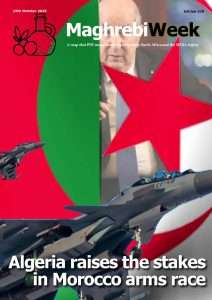Morocco responds to gen Z with health and education boost

Protester holding a banner in Morocco during a Gen Z 212 demonstration.
Morocco’s royal palace announced on October 19 that the kingdom will allocate 140 billion dirhams ($15 billion) to health and education in the 2026 budget, marking a 16% increase compared to 2025 according to the Middle East Monitor via Reuters.
The main source of funding responding directly to nationwide youth protests. The proposed spending on these sectors will account for roughly 10% of Morocco’s GDP, reflecting the government’s attempt to address long-standing grievances raised by the Generation Z-led GenZ 212 movement.
The announcement follows weeks of demonstrations across Moroccan cities, where protesters criticized what they perceived as misplaced priorities: billions spent on stadium construction for the upcoming 2030 FIFA World Cup while hospitals and schools remained underfunded. Youth activists chanted slogans such as, “Stadiums exist, but where are the hospitals?” highlighting the stark contrast between infrastructure projects and social services.

The unrest has been marked by sporadic violence. During late September protests, Moroccan authorities reportedly opened fire on crowds in the Inezgane–Aït Melloul region, leaving three people dead, according to Maghrebi Week. Psychosociologists attribute the escalation to frustration over ignored demands, with young protesters feeling unheard and resorting to direct action.
Adding to the movement, the National Union of Higher Education (SNEsup) staged a two-day strike in early October, opposing the government’s 59.24 Bill, which they argue would privatize higher education and end tuition-free access for students. The union’s support reflects growing solidarity between students, educators, and the broader youth movement demanding fair access to public services.
Tragically, the protests also resulted in the death of a young filmmaker, Abdessamade, on October 1 in Lqliaa, after security forces allegedly opened fire while he documented the demonstrations. His death sparked the viral hashtag #FreeKoulchi, symbolizing demands for accountability and the release of arrested protesters. Authorities report that over 500 people were detained in the early days of the unrest, including 36 minors.
Despite these tensions, Morocco’s economy has shown resilience. Fitch Ratings confirmed the country’s “BB+” rating, while S&P Global upgraded Morocco to BBB-/A-3, noting sound economic policies, manageable debt, and stable growth, projected at 4.4% for 2025. The kingdom is also preparing for the 2030 FIFA World Cup, with infrastructure largely financed through public-private partnerships.
The 2026 budget and the government’s incremental response reflect a delicate balance: maintaining economic growth and investment confidence while addressing social inequities that have fueled one of Morocco’s most visible youth-led movements in recent years. The protests continue, with peaceful sit-ins planned for mid-October, signaling that the call for improved healthcare, education, and transparency is far from over.
Middle East Monitor via Reuters, Maghrebi.org
Want to chase the pulse of North Africa?
Subscribe to receive our FREE weekly PDF magazine











